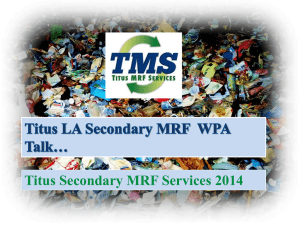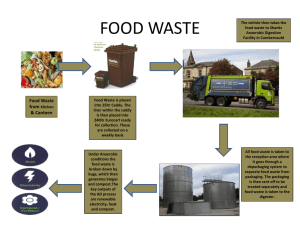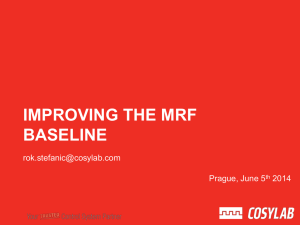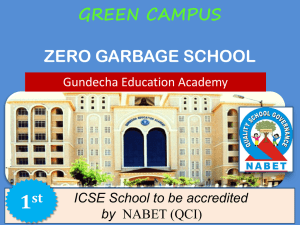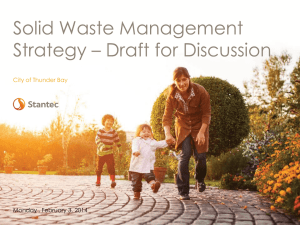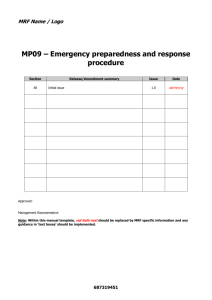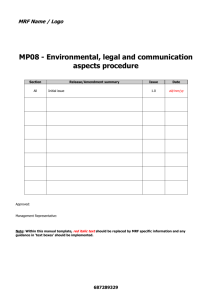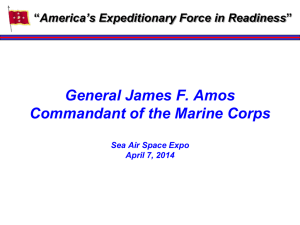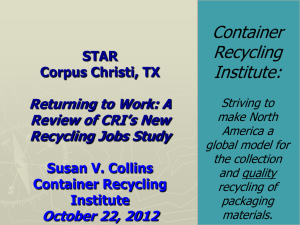presentation - Association of Oregon Recyclers
advertisement
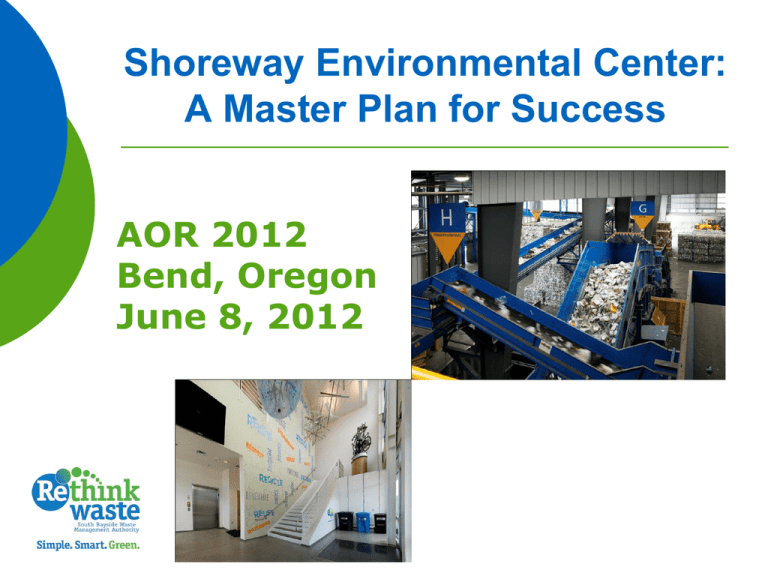
Shoreway Environmental Center: A Master Plan for Success AOR 2012 Bend, Oregon June 8, 2012 RethinkWaste Formed in 1982, RethinkWaste (also known as the SBWMA) is a joint powers authority in San Mateo County which manages 12 separate franchise agreements with Recology and owns an integrated 16-acre recycling, transfer and corporation yard complex in San Carlos, California known as the Shoreway Environmental Center. 2 Shoreway Environmental Center 3 Summary of Success January 1, 2011 Rolled Out New Collection Services for 93,000 Residential Accounts and 10,000+ Commercial Accounts – Cart based, weekly collection service for all materials – New collection fleet with high level of automation and on-board computers – Single stream recycling collection (previous program was dual stream with tubs) – Organics collection for plant materials and food scraps 4 Summary of Success Cont. Completed $47 Million in Master Planned Capital Improvements - New Materials Recovery Facility (MRF) with highly automated processing equipment - Transfer Station with greatly expanded public tipping area - New Public Recycling Center - New traffic flow, scales and scale-house has eliminated traffic back-ups - New education center and other environmental enhancements 5 Background Member Agencies had never gone thru RFP (Original hauler was locally owned scavenger company that was purchased by BFI. BFI purchased by Allied Waste in 1999). Outdated collection services (manual collection of garbage and recycling, every other week recycling collection with tubs, customer provided garbage cans, etc.) Cost plus contract with little incentive for cost controls or service innovation Purchased Shoreway facility from Allied Waste in 1999 for $20 million 6 Background Cont. Fall 2006 hired first Executive Director of JPA to manage contractor selection process, approved core and optional programs and services and draft contract terms, and recommended the following facility improvements: o Shoreway single stream processing equipment retrofit (currently dual stream processing system) o Expanded transfer station to accommodate additional yard waste and food waste 7 Goals for Projects Member Agency Needs Achieving and exceeding state-mandated diversion (recycling) goal of 50% Implementing new collection services and facility operating contracts by January 1, 2011. Existing contracts with Allied Waste expire 12/31/10 Ensuring customers pay competitive rates for quality programs and services JPA Needs Upgrade transfer and processing infrastructure Procure more cost effective facility operations services 8 Old Residential Collection System Mix match of containers, manual and semi-automated collection Dual stream recycling, every other week Yard trimmings only, every other week Weekly garbage, side and backyard collection 9 New Residential Collection System New wheeled carts, automated curbside collection Weekly single stream recycling (all fiber and containers commingled) Weekly compost (organics) = yard trimmings + food scraps + food and beverage soiled paper Weekly garbage (20-gal. cart available) Default cart sizes (32-gal. for garbage, 64-gal. for recycling, and 96-gal. for compost) 10 Single Stream Recycling Small pieces of scrap metal weighing less than ten (10) pounds and fitting into the Targeted Recyclable Materials Collection Container (excluding chain, cable, wire, banding, hand tools, and automotive parts) 11 Shoreway Facility Master Plan November 2006 hired JR Miller to assist with developing a facility master plan April 2007 JPA Board approved facility master plan improvements as follows: o New 72,000 sq. ft. MRF building (replace existing 48,000 sq. ft. MRF building constructed in 1968, purchased and renovated by BFI in 1992) o New state-of-the-art single stream sorting system with separate infeeds for residential and commercial materials o New baler 12 Shoreway Facility Master Plan Cont. o o o o o Major traffic improvements, including relocation of current main scale entrance area, and additional scales and truck queuing lanes New 26,800 sq. ft. addition to transfer station building and demolition of existing southern portion of the building (8,400 sq. ft.) used for self haul tipping. This will add 18,400 sq. ft. of net new tipping area to transfer station. New Public Recycling Center Environmental Education Center Green building features 13 MRF Space Limitations Recyclables tonnage will increase with change to weekly collection Recyclables tonnage will increase with change to single stream Installation of new single stream equipment requires more space Outdoor storage of some commodities 14 Challenges Along the Way Simultaneously managing two RFP processes (franchised collection services provider, and facility operator) and a facility master plan Managing capital improvements while keeping facility running Total contract awards = Nearly $1 billion over 10 years = Politics of trash 15 Challenges Along the Way Cont. Governance structure required separate franchise agreement approvals by all 12 Member Agencies (MAs), facility operator approval by two-thirds of MAs, and debt issuance approval by two-thirds of MAs Financial collapse of 2008 Service provider transition Need for constant re-education of key decisionmakers given length of process 16 Facility Operations Procurement Process Released RFP in November 2007 Received 7 proposal responses in March 2008 Allied Waste, BEST (joint venture of four privately owned local companies), Greenstar, Hudson Baylor Corp. with Waste Solutions Group, Norcal, Republic Services, and South Bay Recycling, (joint venture of Community Recycling and Potential Industries). Selected South Bay Recycling (SBR) as Operator in April 2009. SBR partnered with BHS for single stream equipment design and installation services. Awarded contract in July 2009 and operations initiated 1/1/11. MRF start-up in April 2011 17 Proposal Results Received 7 proposals from highly qualified firms Within 7 proposals received multiple MRF equipment designs. In total, the seven proposers presented 11 equipment design and layout options with designs coming from four different equipment vendors (BHS, CP, Machinex, and Bollegraaf/Van Dyk Baler). Final negotiated MRF fee of $66.45/ton for 2011 (now is $70.53 for 2012). Includes the cost to also manage a public buyback and drop-off center. Excludes MRF bldg. and equipment depreciation and interest. 18 Operational Goals for MRF Operation State-of-the-art MRF that maximized commodity revenues and produced less than 10% residue through meeting detailed equipment selection and installation requirements, product quality standards, and a system acceptance test Insistence on performance tracking throughout the life of the process 19 Facility Operations Agreement Revenue guarantee and revenue sharing o o Revenue guarantee to Agency of $6.5 million/year 25% revenue share with operator once guarantee met Incentive structure to reduce plant residue MRF RESIDUAL GENERATION 10%> INCREASE IN COMMODITY SHARE no increase 9.0% - 9.9% 1% increase (becomes 26%) 8.0% - 8.9% 2% increase (becomes 27%) 7.0% - 7.9% 3% increase (becomes 28%) 6.0% - 6.9% 4% increase (becomes 29%) 5.0% - 5.9% 5% increase (becomes 30%) 4.0% - 4.9% 6% increase (becomes 31%) <3.9% 7% increase (becomes 32%) 20 Outstanding MRF Performance 21 Outstanding MRF Performance Original Design Requirements 30 tons/hour processing line for Residential Single Stream 15 tons/hour processing line for Commercial Single Stream Current Performance of MRF ≥ 90% Uptime ≤ 10% of processed materials sent out as residuals 95% recovery of available recyclables 1+ ton processed per labor hour Ave. Residential Single Stream throughput of 30.68 tons/hour Ave. Commercial Single Stream throughput of 20.36 tons/hour 96.4% Uptime 6.8% of processed materials sent out as residue 98.9% recovery of available recyclables 2+ tons processed per labor 22 hour Other MRF Metrics Inbound tonnage averages 250 tons per day Tonnage is 63% from residential and 37% from commercial Shipped tons (commodities) were 75% fiber and 25% containers Average commodity revenue for 2011 was: $168/ton for fiber, $331/ton for containers and a blended value of $208/ton 23 MRF Before and After 24 MRF Before and After 25 Residential Program Results for 2011 Residential by the numbers… 2010 to 2011 Recycling: +25.07% (32,507 tons to 40,655) Compost: +29.27% (58,306 tons to 75,373) Garbage: -17.46% (71,840 tons to 59,300) Measured Diversion: 66.2% Nearly 80% of customers in 32-gallon and smaller garbage carts Approximately 18.5% have 20-gallon garbage carts 26 Record Residential Diversion Results Allied 2010 vs. Recology 2011 Tons Recycling: +25% Compost: +29% Garbage: -17.50% 2011 Diversion = 66.2% 2010 Diversion = 55.8% 27 Self-Haul Diversion - A Success Story 77% diversion rate for self haul materials at Transfer Station. This means that of 47,000 tons of materials brought in by the public last year, nearly 36,500 tons were recovered for either reuse or recycling. The high diversion rate is attributable to the expanded floor space (master plan project), fee structure and the Shoreway operator’s diversion program 28 Education Center Tours Program 2012 Tours Participants 900 812 800 723 700 600 435 500 472 433 400 300 200 150 100 0 January February March April May June 2012 Tours Participants Over 3,000 visitors, 80% from school groups 29 Education Center 30 Solar Powered MRF With 2,700 panels producing 230 watts each, the Shoreway Environmental Center is able to power the 650-kW MRF sorting equipment using only solar power. 31 U.S. Green Building Council LEED Certification The facility was submitted to U.S. Green Building Council for LEED Gold certification in 2012. Sustainable elements cited in the LEED application include: Shading element/features for reducing interior heat gain Translucent wall panels for increased day lighting High solar reflectance roof coating Low water usage plumbing fixtures used in all toilet rooms Water efficient irrigation system and planned reclaimed water connection Recycled material for interior wall and floor finishes and recycled steel building framing Reuse of 50,000 square feet of the existing transfer station building structure 96.3% of construction, demolition and land clearing waste diverted from the landfill during MRF demolition 32 Innovation and Best Practices Facility RFP and Master Planning Established performance based equipment specifications for the single stream equipment (within the RFP) as opposed to being overly prescriptive about equipment features and layout Extensive tours of MRFs to capture best practices to establish performance parameters Engaged potential proposers during RFP development process by allowing them to review an early draft of facility operations RFP 33 Innovation and Best Practices Cont. Facility RFP and Master Planning Cont. Included MRF equipment design and installation as part of the scope of services within the facility operations RFP Integrated the equipment layout and building design for maximum operational efficiency and space utilization. MRF building was designed concurrently and in-sync with the design of the single stream processing equipment provided by Bulk Handling Systems (BHS). Integrated reverse vending machines (public buyback) into MRF operations 34 Innovation and Best Practices Cont. Facility RFP and Master Planning Cont. Operator input throughout process Performance Incentives in Operations Agreement Programmatic Acceptable materials list developed with facility operations in mind (small scrap metal, no plastic bags, etc.) Education center feature Regular contamination monitoring 35 MRF Trends Continued automation Flexible equipment designs to meet changing inbound materials stream Mining MSW for organics 36 Contact Information Kevin McCarthy, Executive Director Phone: Email: Web: Facebook: Twitter: 650.802.3505 kmccarthy@rethinkwaste.org www.RethinkWaste.org www.Facebook.com/RethinkWaste www.Twitter.com/RethinkWaste 37 Any Questions? Any Questions? 38
